| Srl | Item |
| 1 |
ID:
186108
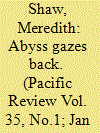

|
|
|
|
|
| Summary/Abstract |
This article examines the ways in which the North Korean regime filters and re-interprets various ‘messages’ from the outside world for its domestic audience through the lens of state-produced literature. In broad strokes, I identify three main types of foreign interactions purported to send a ‘message’ to North Korea – economic sanctions, summit diplomacy and military exercises/fleet movements – and examine how these are treated in North Korean fiction produced by the Korean Writer’s Union, an important arm of the Party’s Propaganda and Agitation Department. Each of the three interaction types represents a formal effort by an outside government – typically the United States or its allies – to send a message to the regime or its people and thereby shape their behavior and/or perception of the outside world. By examining how these ‘messages’ are portrayed in North Korean fiction, we can gain insight into how the regime shapes internal narratives about foreign affairs, as well as what sort of alternative narratives it is most anxious to intercept or disrupt.
|
|
|
|
|
|
|
|
|
|
|
|
|
|
|
|
| 2 |
ID:
149944
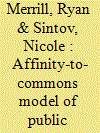

|
|
|
|
|
| Summary/Abstract |
As atmospheric CO2 continues to rise above 450 PPM, policymakers struggle with uncertainty concerning predictors of citizen support for environmental energy policies (EEPs) and preferences for their design, topics which have received limited attention in empirical literature. We present an original model of policy support based on citizens’ affinity-to-commons: pathways by which individuals enjoy natural public goods that in turn shape preferences between alternative policy mechanisms. We evaluate this model using a survey of southern California electricity customers, with results indicating the model's utility in predicting public support of EEP. Stronger community ties are associated with preferences for “pull”-type subsidies, whereas stronger connections to natural commons are linked to support for both “pull” and “push”-type sanctions. Findings have implications for coalition building as advocates may engender support for green energy policy by framing sanctions as protecting natural commons, and framing subsidies either in this same way and/or as producing benefits for communities.
|
|
|
|
|
|
|
|
|
|
|
|
|
|
|
|
| 3 |
ID:
144739


|
|
|
|
|
| Summary/Abstract |
Over the past 15 years, Russia’s model of political-economy has evolved around three main channels of global economic integration: 1) export of natural resources and a national system of redistribution of export revenues; 2) financialisation, acting as a boost for domestic consumption/demand; and 3) the offshore integration of Russian capital into global capital markets. The current crisis is affecting all three channels of Russia’s global political economy. Together, reduced export revenues, the deepening financial crisis and the dominance of offshore-sourced investments into Russia, serve as crisis transmission mechanisms, and thus constitute three sets of (inter-related) dilemmas for the Russian authorities. Four scenarios of possible development of the current situation are provided.
|
|
|
|
|
|
|
|
|
|
|
|
|
|
|
|
| 4 |
ID:
051907
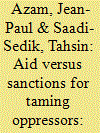

|
|
|
| 5 |
ID:
177858
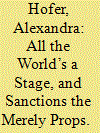

|
|
|
|
|
| Summary/Abstract |
This article argues that sanctions are interactional tools; their interactive nature is evident if these measures are considered as a form of stigmatization, which is the outcome of an interaction between the group imposing the stigma and the actor that is stigmatized. Stigmatized states do not always accept the label that is placed upon them and can adopt strategies to counter or resist stigma. From a symbolic interactionalist perspective, this can be understood as a state’s foreign policy role. Such an approach is illustrated through a study of Russia’s response to being sanctioned by the EU and the US for its policies in the Ukrainian crisis. It is argued that Russian leaders are unlikely to cave into Western pressure because they reject the role of deviant that is placed upon their state and instead adopt the role of the ‘untouchable’ state, which is consistent with Russia’s great power identity. Though the sanctions may enable the EU and the US to activate their roles as normative powers, in the context of the Ukrainian crisis, they have locked the parties into roles that contribute to the crisis’ duration.
|
|
|
|
|
|
|
|
|
|
|
|
|
|
|
|
| 6 |
ID:
019975
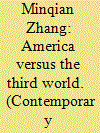

|
|
|
|
|
| Publication |
July 2001.
|
| Description |
18-36
|
|
|
|
|
|
|
|
|
|
|
|
|
|
|
|
| 7 |
ID:
052820
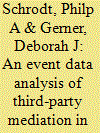

|
|
|
| 8 |
ID:
057479
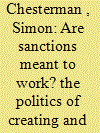

|
|
|
| 9 |
ID:
022474
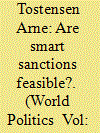

|
|
|
|
|
| Publication |
April 2002.
|
| Description |
373-403
|
|
|
|
|
|
|
|
|
|
|
|
|
|
|
|
| 10 |
ID:
101380
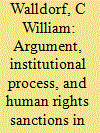

|
|
|
|
|
| Publication |
2010.
|
| Summary/Abstract |
When do humanitarian norms lead great powers, especially democracies, to impose sanctions against strategic partners and allies? I argue that answering more specific questions like this in space and time requires constructivists to focus greater attention on institutional and ideational process. Agents are central to policy change. But the ideational and institutional context in which agents build arguments determines when this change is more or less likely. In this vein, I argue that three factors in liberal states - legislatures, the nature of activist pressure, and strategic ideas - explain when humanitarian norms produce sanctions. I demonstrate the argument through a study of US Cold War relations with South Africa, Turkey, and Greece. Among other contributions, this article demonstrates how attention to process can extend the constructivist agenda into a series of new empirical domains and open avenues for contributions to important policy debates.
|
|
|
|
|
|
|
|
|
|
|
|
|
|
|
|
| 11 |
ID:
154928
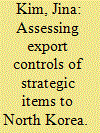

|
|
|
|
|
| Summary/Abstract |
This paper aims to show trading patterns of certain items highly likely to be used
to develop nuclear and missile programs in North Korea. It analyzed North Korea’s
trade of nuclear―and missile―related items for ten years from 2006 to 2015 to
identify items in large volume as well as in increased demand and key suppliers
that contribute to sanctions―busting. This paper found that UN sanctions against
North Korea were not effective in controlling the flow of strategic items to North
Korea. Rather, a small number of states are responsible for a large share of trade
with North Korea that has continued to seek alternative suppliers. It also found
that China is a single supplier for multiple items and plays a major role along with
several others that either specialize in exports of specific items or gradually expand
the scope of supplies. Because the presence of a third country that provides North
Korea’s resilience and diversion of sanctions is crucial, this paper recommends
policy suggestions to enhance effectiveness of the existing sanctions regime.
|
|
|
|
|
|
|
|
|
|
|
|
|
|
|
|
| 12 |
ID:
121669
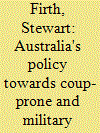

|
|
|
|
|
| Publication |
2013.
|
| Summary/Abstract |
Events in Thailand, Fiji and Burma in 2006 and 2007 focused attention on Australia's foreign policy response to regional coup-prone states and military regimes. Australia's official reaction to these events took different forms: for Thailand, a mild rebuke that brought no change in Thai-Australian relations; for Fiji, condemnation, the imposition of sanctions and a call for the people of Fiji to rebel; and for Burma, a change of policy that brought financial sanctions against the military regime. This article argues that, in responding to these regimes in different ways, Australian governments act on the basis of differing prisms of understanding through which they assess regions and states. The differences ultimately arise from calculations of Australian national security, strategic interests, alliance maintenance and power potential, but tend to be obscured by the universalist rhetoric of promoting democracy and protecting human rights, to which Australian governments subscribe. As the security dynamic in the Asia-Pacific changes as a consequence of the rise of China, Australian policy towards coup-prone states and military regimes in the region is likely to favour stability over democracy or the protection of human rights.
|
|
|
|
|
|
|
|
|
|
|
|
|
|
|
|
| 13 |
ID:
187981
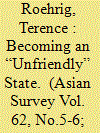

|
|
|
|
|
| Summary/Abstract |
When Russia invaded Ukraine, South Korea’s initial response was cautious. While criticizing Moscow’s actions, the Moon administration also indicated it would join any multilateral sanctions effort but would not impose its own unilateral sanctions as the United States, the European Union, and other Western democracies had done. After receiving internal and external criticism along with the likelihood of economic repercussions for not imposing its own sanctions, South Korea changed course and altered its hedging strategy toward a more robust response to Russian aggression. The war forced South Korea to reassess its relationship with Russia, and despite landing on Moscow’s list of “unfriendly” states, determined that its long-term interests were better served by altering its ties with Russia in favor of greater alignment with other liberal democracies.
|
|
|
|
|
|
|
|
|
|
|
|
|
|
|
|
| 14 |
ID:
021177
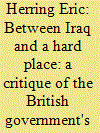

|
|
|
|
|
| Publication |
Jan 2002.
|
| Description |
39-56
|
|
|
|
|
|
|
|
|
|
|
|
|
|
|
|
| 15 |
ID:
144813
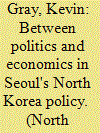

|
|
|
| 16 |
ID:
182901
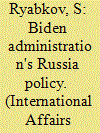

|
|
|
| 17 |
ID:
060921
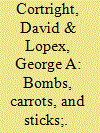

|
|
|
| 18 |
ID:
064653
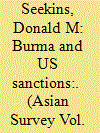

|
|
|
|
|
| Publication |
May-Jun 2005.
|
|
|
|
|
|
|
|
|
|
|
|
|
|
|
|
| 19 |
ID:
056593
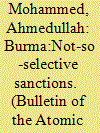

|
|
|
| 20 |
ID:
172469
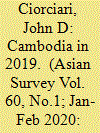

|
|
|
|
|
| Summary/Abstract |
In 2019, Cambodia saw long-ruling Prime Minister Hun Sen tighten his grip on power. Economic growth continued, but with rising risks related to a real estate bubble, mounting debt, and yawning social inequality. Externally, Cambodia deepened its dependency on China, insulating the Hun Sen regime in some respects but contributing to new vulnerabilities.
|
|
|
|
|
|
|
|
|
|
|
|
|
|
|
|